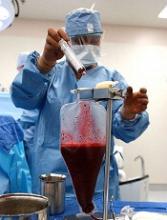The U.S. Food and Drug Administration (FDA) has granted orphan designation to PLX-R18 for the treatment of graft failure and incomplete hematopoietic recovery following hematopoietic stem cell transplant (HSCT).
PLX-R18 consists of placenta-derived, mesenchymal-like adherent stromal cells that are designed to be administered to patients without the need for tissue or genetic matching.
PLX-R18 cells release a combination of therapeutic proteins in response to a damaged or poorly functioning hematopoietic system.
PLX-R18 is currently being evaluated for the treatment of insufficient hematopoietic recovery following HSCT in an ongoing, phase 1 trial (NCT03002519).
The trial is designed to evaluate the safety of intramuscular injections of PLX-R18 cells in 24 subjects with incomplete hematopoietic recovery persisting for at least 4 months after HSCT, with a 12-month follow-up period.
The primary endpoint is safety. Exploratory endpoints include changes in platelet and hemoglobin levels, changes in transfusion frequency, a shift from transfusion dependence to transfusion independence, changes in quality of life, and changes in the serum immunological parameters.
PLX-R18 is being developed by Pluristem Therapeutics, Inc. PLX-R18 also has orphan designation for the treatment of acute radiation syndrome.
About orphan designation
The FDA grants orphan designation to products intended to treat, diagnose, or prevent diseases/disorders that affect fewer than 200,000 people in the United States.
The designation provides incentives for sponsors to develop products for rare diseases. This may include tax credits toward the cost of clinical trials, prescription drug user fee waivers, and 7 years of market exclusivity if the product is approved.


